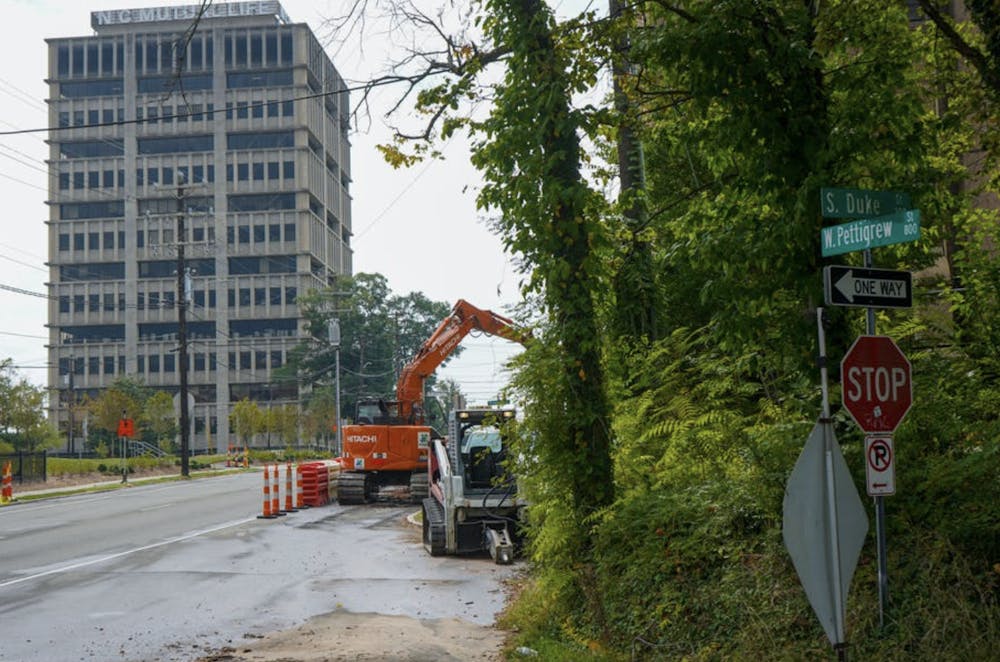A new Durham initiative will soon begin providing monthly $500 checks to 115 formerly incarcerated individuals.
The Excel Pilot Program is set to start administering payments on Jan. 5, 2022 and will continue to do so for a year. This effort is backed by StepUp Durham, a 501(c)(3) non-profit that seeks to “transform [people’s] lives through employment and life skills training."
One of the goals of this program is to provide proof of concept for the potential implementation of a federal guaranteed income program. In this context, a guaranteed income is defined as a monthly cash payment given directly to individuals, free of conditions and work requirements.
While Durham is operating this program with formerly incarcerated residents, other cities across the country are running similar pilot programs on different populations. For example, a guaranteed income pilot in Columbia, South Carolina is focusing on Black fathers.
“We could have certainly chosen a random sample [to run the program on], but what we realized is that we really want Durham to be a city of second chances,” Durham Mayor Steve Schewel said. “One of the ways [to do this] is to provide opportunities for our citizens who are coming home from incarceration. We thought that they would be a group that would really benefit from guaranteed income.”
Schewel is part of Mayors for a Guaranteed Income, a network spanning over 40 cities advocating for a federal guaranteed income.
“Any group we would have selected, whether it was single mothers, single fathers, folk who [are] formerly homeless, or [folk] on the verge of eviction, an incredible case could be made for any group which is why, ultimately, our goal is to make it a basic income for everyone,” Durham City Councilman Mark-Anthony Middleton said. “I proposed that we focus on [formerly incarcerated folk] because if you think of all the issues that folk face economically, it’s all kind of compounded and present within this population that is just getting out of jail," he continued.
“[They also face] the stigma of not being able to find a job, that there are housing issues, that there are transportation issues,” Middleton said. “You have to check that box that says yes, I’ve been convicted, or yes, I’ve been to jail.”
Data from guaranteed income programs across the country will be provided to the Center for Guaranteed Income Research (CGIR) at the University of Pennsylvania School of Social Policy & Practice. The information will be used to “consolidate key learnings from the pilots taking place in MGI member cities, address knowledge gaps in the contemporary understanding of guaranteed income’s impact for Americans, and allow [Mayors for Guaranteed Income] to layer data with anecdotal evidence in federal advocacy.”
According to Syretta Hill, executive director of StepUp Durham, a researcher from the CGIR will be responsible for selecting the 115 individuals who will receive checks among the over 300 formerly incarcerated people who signed up. Another 115 will be chosen to act as the control group and will not receive checks. The researcher will also be responsible for gathering the necessary data from the participants.
“We thought we were in a great position to help administer the program as we have many contacts within the community from people we’ve worked with before,” Hill said. “The hope is we can push against this stigma that individuals who are formerly incarcerated are not motivated and don’t know how to use their resources. We found out that many of the folks we work with are highly motivated and they know how to use their resources, they just don’t have enough of them.”
While critics point to the costs of implementing such a program and the potential for it to remove or reduce the incentive to work, advocates argue that it reduces poverty and income inequality, leads to positive job growth and lower school dropout rates and empowers traditionally unpaid roles.
“What we have seen is that people who have received the guaranteed income have been able to stabilize their lives, help them in a position where they can perhaps make a payment on a car, or make sure they can pay their rent,” Schewel said. “A lot of our folks who come home from incarceration don’t have a place to live. These are really important, very basic terms of things that we hope to see some improvements on.”
Middleton agreed, citing the various benefits of a federally guaranteed income program.
“We're not giving away exotic cars or big mansions. This is basically us as a society saying there is a line beneath which we will not allow you to fall by virtue of you, by virtue of your humanity, and by virtue of your citizenship,” Middleton said.
“When people aren't doing creative calculus about how they're going to feed their children or pay their bills, it makes for better neighbors, when folk don't have to come up with creative ways to do things that a lot of us take for granted," he continued.
A few Durham residents had voiced concerns over the program given its cost and target population. According to Schewel, however, “the response [from the city has been very positive],
and most people are “super excited” about the program. Middleton received similar feedback.
“I got some pretty colorful messages and responses, but overwhelmingly, the people of Durham, the messages I received, were supportive,” Middleton said.
The program is still accepting applications; those interested can apply by filling out a pre-screen eligibility form. The requirements state that applicants must be at least 18 years old, reside in Durham, have an income below 60% of the area median income and have been incarcerated within the past five years. There is no citizenship eligibility requirement.
Get The Chronicle straight to your inbox
Signup for our weekly newsletter. Cancel at any time.

Jazper Lu is a Trinity junior and managing editor of The Chronicle's 119th volume.

